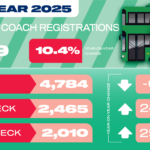With Christmas just around the corner – and some of us still in need of some last-minute buys – many of us will be shopping for gifts online this year. And with online marketplace sales soaring, we’re likely to turn to sites like eBay, Amazon and Etsy for the best deals.
However, while these sites can provide rare finds and bargains, they also present risks when it comes to buying from third-parties and international sellers.
That’s why Mike Ryan, Chief Executive at PACK & SEND, has put together his tips on what should shoppers be looking for – and avoiding – when using online marketplaces.
Getting the best deal
Marketplace bidding often sees buyers overpay for items, fearing missing out on a deal. You may be tempted to pay extra for a rare item you can’t find elsewhere. But many marketplaces let you set up an alert, sent directly to your email address when a similar item is listed in the future.
Similarly, reverse image searches can help you find similar products on other sites. Right-click on the image of your rare item and select ‘search Google for image’ – this searches the web for similar images online, which can help you find the item elsewhere.
On bidding sites, competition can drive prices way above an item’s value, so it helps to find auctions with fewer watchers and bidders. One way to find hidden gems is searching for common misspellings of your keywords.
For example, if you’re searching for brand name products – like a Burberry coat – try some variants on the spelling, like ‘Burbery’.
Sellers occasionally misspell words when listing items, meaning they don’t show up on user searches – so, if you’re able to find them, you may be able to bag a better price, with less competition.
Know your seller… and your items
Many online marketplaces allow anyone to list items, so they don’t always offer buyers the same consumer rights that cover them when purchasing from a registered trader.
Check the seller’s reviews and feedback to get an idea of their reputation. Most sites even let you message sellers directly, so you can review their customer service standards.
Ask them to provide extra high-quality images if needed, to view the item’s condition. If it’s manufactured by a particular brand, compare it to products on the official website, looking for differences in size, colour and subtle details.
There are even detailed buying guides available online for certain brands, which can help you tell a genuine item from a fake.
Make sure to read everything on the listing – including the condition of the product and its dimensions. A woman recently purchased a set of deckchairs online, thinking she’d secured a bargain price, only to find they were actually novelty miniature models.
If you’re cautious about the site, look for a money-back guarantee in the conditions, so you know you’re covered if there’s a problem – even if the seller refuses a refund.
Buying from international sellers
Many online markets operate globally, allowing you to buy products from around the world. However, buying from international sellers presents potential risks.
For items listed in a local currency, check the exchange rate to avoid any nasty surprises. And be aware that, for some items, you may have to pay an additional customs fee to collect your item in the UK.
If you need the product by a certain date, contact the seller to ask about estimated dispatch and delivery times when shipping to the UK.
Check for local nuances in the product, too. For example, when buying electronics, international products may come with built-in mains adapters which won’t fit UK sockets.
Payment protection
Online buyers should also be cautious when paying for items, as insecure payments could see their card details end up in the wrong hands.
Many sites encourage payment through secure third-party services like PayPal – setting the platform as the default method. However, more loosely regulated sites like Facebook Marketplace don’t have built-in payment platforms and leave it to users to arrange.
On these sites, contact the seller to let them know you intend to pay via credit card or through a secure service like PayPal. This gives buyers the peace of mind that potential fraudulent transactions will be fully investigated.
Click and collect
Often, sellers on marketplaces like Facebook and Gumtree will list items as ‘collection only’. So, it’s important to check the seller’s location, to make sure the cost of the trip won’t outweigh the cost of the item.
If you’re looking to buy an antique or fragile item, you may be worried about getting it home safely. However, working with a shipping specialist means you can arrange for items to be picked up, packaged securely and delivered directly to your door, for peace of mind.


















